
After almost five years of talking about it, Ale Together Now finally got together at River's Edge Brewing Company in Milford for a tour! We had the whole brewery to ourselves to explore the facility, taste samples, and learn about the history of REBC and their brewing process.
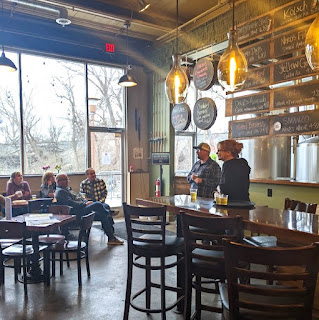
To begin the program, we enjoyed a sample of Kölsch, a crisp, clean, and refreshing German style ale. This brew is a well-loved flagship at River's Edge Brewing, and is brewed with a traditional recipe using German Magnum hops.
If you're a big fan of Kölsch, don't forget to visit the brewery on the first Saturday of every month for Kölsching Saturdays in the Huron Room! Kölsching Saturdays is a recreation of the traditional German drinking experience that originated in Cologne, Germany. Enjoy a stange of Kölsch and, as long as your coaster stays beneath your beer, your server will bring you a fresh Kölsch whenever your stange runs out! Signal that you're done by placing your coaster on top of your stange.
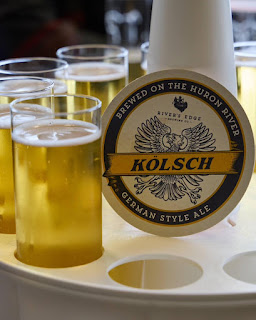
River's Edge Brewing Company was founded in 2014, and is housed in what used to be a 1950's factory. The brewery is made up of the main taproom, the Huron Room, and the The Suzanne Haskew Arts Center (The SHAC). When the brewery was installed, modifications were made to the flooring and beams of the taproom, and old doors were made into beautiful tables. An arch theme is prevalent in the design of the building, including above all of the taps, reminiscent of the arch at the river where the train crosses over.
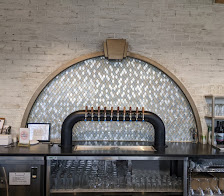
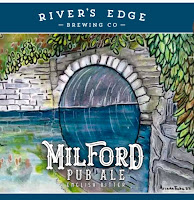
The design is even present on the can design for Milford Pub Ale! This beautiful design was made by local artist Ariana Fate.
After touring the building, we explored the brewing process and looked over all of the equipment and ingredients that make amazing beer possible. All beer is made with water, malt, hops, and yeast; other ingredients are called adjuncts, and are not always included in the recipe. Interestingly, as simple an ingredient as water may seem, the minerals present in water can have a huge impact on how a batch of beer turns out. At River's Edge, a nano filter is used to strip the water of extra minerals and solids before it is used in brewing.
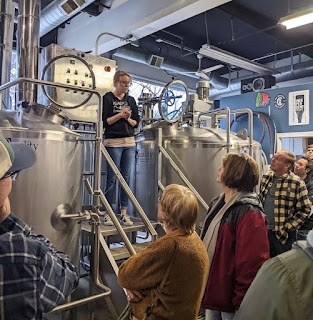
Malt is a grain, usually barley, that provides sugar from carbohydrates to be fermented into carbon dioxide and ethanol. Malted grains are any grain that is allowed to germinate (which releases carbohydrates) and then dried. These malted grains are then milled, crushing them to expose greater surface area of the inside, and then mashed. During mashing, hot water is mixed with the milled grains to convert the starches of the grain into sugar. This makes a porridge-like sludge called the 'mash'.
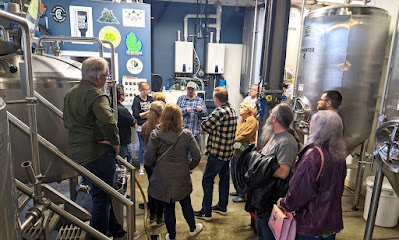
Hops contribute aroma and bitterness to beer, and also act as a natural preservative. Hops are pelletized to extend shelf life, and are added during the boil stage of brewing. The boil usually lasts for an hour to an hour and a half, depending on the style of beer being brewed. The sooner the hops are added during the boil, the more bitterness transfers into the beer. When hops are added later in the boil, more aroma and flavor is contributed to beer.

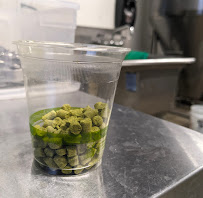
After the boil, the wort is cooled using a cold liquor tank, which moves cold water through the pipes to help cool the wort quickly. When the wort is at a safe temperature, yeast is added to begin the fermentation process. Saccharomyces cerevisiae as added to ale beers, and ferments at the top of the wort. Saccharomyces pastorianus is added to lagers, and ferments at the bottom of the batch at lower temperatures. Most beers will ferment for about two weeks, but lagers can take longer since they ferment at lower temperatures.
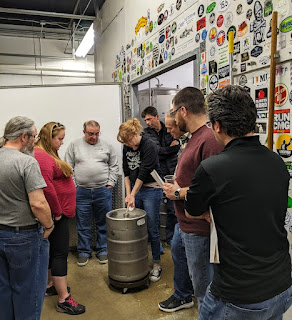
We got to sample some kölsch from a fermenter, referred to as a 'grain beer' kölsch. It was flat, a little fruity in flavor, and slightly cloudy. With more time in the fermenter, followed by a secondary fermentation in a cask (shown above), this batch of kölsch will be ready to serve to the public.
Next, we moved into the main taproom and learned about glassware, cask ale (of which we tried a sample of Milford Pub Ale), and pouring the perfect pint. Of course, when discussing glassware, Michelle offered her usual nugget of wisdom on the matter: "Anything you can drink beer out of is acceptable glassware!"
Thank you so much to Michelle and Ryan of River's Edge Brewing Company for their time and efforts to bring our Ale Together Now group to the brewery. We had so much fun learning about the brewery and seeing the ingredients and equipment that we've been learning about in our monthly programs.
Don't forget to learn more about River's Edge by visiting their website, and be sure to join us for our next Ale Together Now session in May! We hope to see you around the brewery and at the Library this spring.
Cheers!